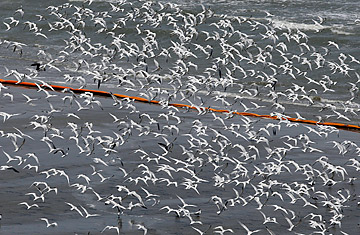
Seagulls and other birds fly past oil booms protecting coastline from a spill from last week's collapse of the Deepwater Horizon oil rig, Saturday, May 1, 2010, along the North Shore south of Venice, Louisiana.
(2 of 2)
Just after noon on Saturday, Glen Swift, a 62-year-old fisherman, stood outside a high school here, clutching a bundle of papers that temporarily signed his boat over to British Petroleum's cleanup effort for $2,000 a day. (BP officials won't confirm how much it is paying for the boats, or hired cleanup workers.) At the height of catfish season, he figures he'd make about $3,500 a day. But with oil approaching his home base of Buras Bay, just a few miles to the east of here, there are few other options. "What am I gonna do?" he asked.
That was the overriding question bedeviling BP and government officials as they continued to struggle to come up with a solution for the escalating spill. The growing crisis began April 20, when the Deepwater Horizon rig leased by BP exploded about 50 miles south of here, in the Gulf of Mexico, forcing the evacuation of 126 workers and the deaths of 11 others. Oil spills typically involve collision of vessels, so it's relatively easy for officials to estimate precisely how much oil has escaped into the water. The situation unfolding in the Gulf of Mexico is very different. Officials have estimated that some 5,000 barrels of crude oil — or 210,000 gallons — have leaked from the Gulf's floor since Tuesday. But U.S. Coast Guard Commandant Adm. Thad Allen acknowledged Saturday that it's impossible to make a reliable estimate right now. "Until we cap the leak, we have an indeterminate amount of oil that can come to the surface,"Thad Allen said during a news conference Saturday. "That makes this event unprecedented." The oil slick over the water's surface has seemed to triple in size over the past two days, which could indicate an increase in the rate that oil is spewing from the well, according to the Associated Press.
The officials also said that it's very likely oil will reach the shoreline, including, quite possibly, Alabama and Florida. "The question is when, and where," Allen said. So far, the spill has not impacted shipping routes, particularly into the Mississippi River, one of the world's busiest shipping corridors. Meanwhile, the officials also said they are contemplating whether water from various tributaries, including the Mississippi River, can be redirected to essentially push the oil slick further from the shoreline.
The government has made clear that BP, the London-based company that leased the Deepwater Horizon rig nearly 50 miles south of here, will bear the ultimate cost of the cleanup. Company officials say they are spending at least $7 million a day for the cleanup, and that they expect the cost to soar once as it is forced to remove oil that is expected to reach the coasts in the coming days. Thousands of miles of booms are being placed along the Gulf Coast in an attempt to contain the oil.
But the federal government hasn't escaped criticism for its response to the disaster, and President Obama is now planning on visiting the area on Sunday.
It's hard to know, at this point, what the long-term effects will be on the region's seafood industry. "We don't know when we'll be able to open up that water again," Foote says. One fear is that a strong gust of wind might push the oil into Lake Pontchartrain, just to the north of New Orleans. That will deliver another blow to the state's seafood industry: It's home to many professional and amateur crabbers.
For his part, shrimper De La Cruz is carefully contemplating what to do next. He may take his boat to Virginia. Or Mexico. "You ain't gonna see nothing around here for a long time," he says, adding, "This is gonna' be worse than a hurricane. It just feels like the end."
